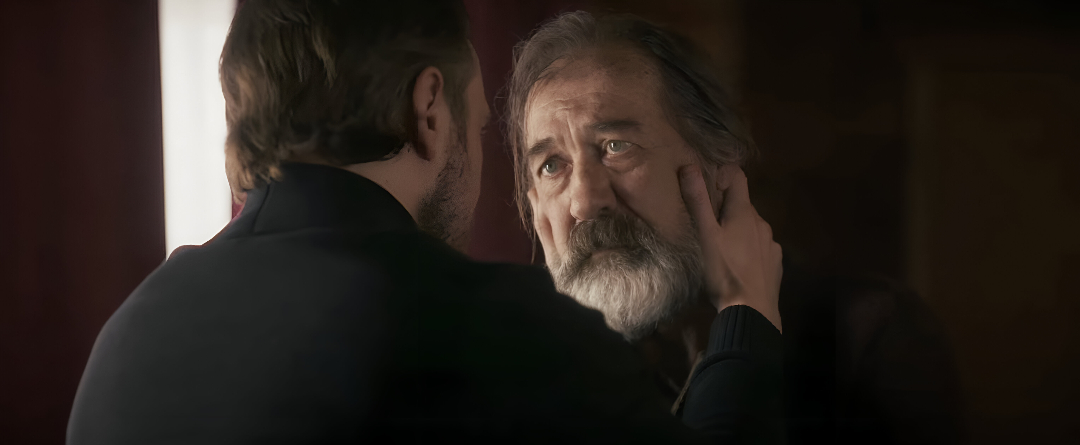Directed by Michael Peterson, Shudder’s horror film ‘Shadow of God’ ends with a harrowing and deeply unsettling finale. After relentless pressure from Beau and a group of devout Catholics, Mason Harper finally agrees to summon God, but what follows is far from divine intervention. In a shocking turn, the protagonist takes a drastic final step that seemingly ends the chaos plaguing the town. While the conclusion may appear satisfying on the surface, it’s steeped in darkness and pessimism, leaving viewers with more questions than answers. The movie’s haunting final moments aren’t just unsettling; they demand contemplation, especially when it comes to what really happens to Angus! SPOILERS AHEAD.
Shadow of God Plot Synopsis
In ‘Shadow of God,’ Mason is a seasoned exorcist and grieving father whose faith is tested in ways he has never imagined. The film opens with a chilling exorcism as the father confronts a demon that refuses to reveal its name. As he presses on, the entity cryptically whispers, “You already know my name.” The session spirals into chaos, ending in tragedy when the protagonist’s partner, Father Scott, is brutally killed. Haunted by the failure, Mason retreats to his hometown, hoping for solace, but peace is the last thing waiting for him there.
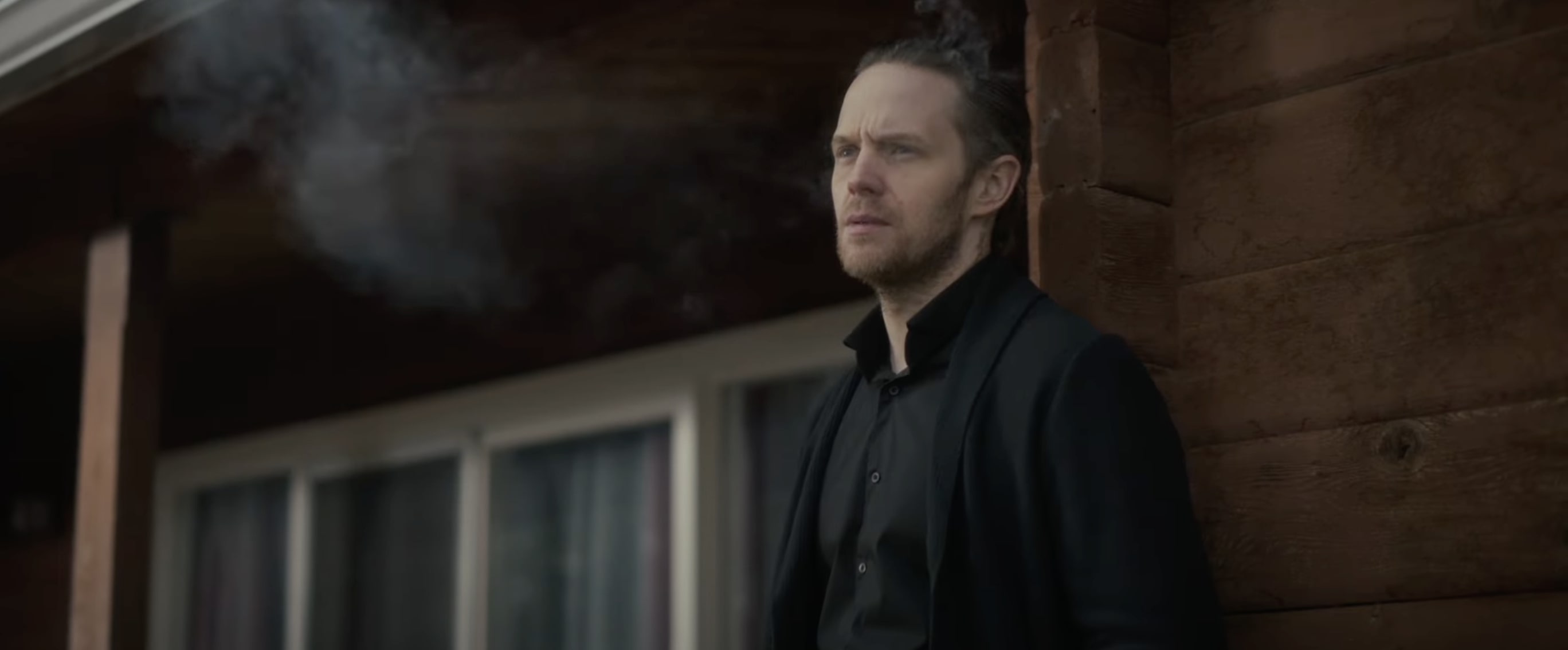
Soon after Mason’s return, he’s confronted with the impossible: his estranged father, Angus Harper, long presumed dead, has returned. But Angus isn’t himself. Possessed by something ancient and malevolent, he claims to hold answers Mason has spent a lifetime avoiding. When a desperate exorcism attempt fails, he is forced to confront buried truths and unthinkable choices. Meanwhile, his partner, Tanis Green, is abducted by a fanatical Catholic cult convinced that the protagonist plays a key role in fulfilling a prophecy.
Desperate to save Tanis, Mason agrees to perform an arcane, otherworldly ritual—one that threatens to blur the line between salvation and damnation. In the film’s scarring climax, the father, with Tanis and Angus, confronts the divine entity that has shadowed his bloodline. Though they manage to close the chapter on the immediate threat, the final moments suggest that the darkness may not be gone—it may have just changed its shape.
Shadow of God Ending: How Does Angus Harper Survive?
The ending of ‘Shadow of God’ leaves audiences with a haunting ambiguity, particularly regarding the fate of Angus Harper. The sequence begins with Mason’s climactic confrontation with the divine entity inhabiting his father. The protagonist, driven by desperation and faith, performs an unauthorized exorcism using a sacred dagger. This act is intended to sever the connection between Angus and the holy presence, which Mason believes is wreaking havoc on the mortal world. In the final moments, the exorcist plunges the dagger into what is referred to as the “mortal form of the God,” a manifestation of divine power. He then uses its blood in the ritual, causing the entity to vanish.
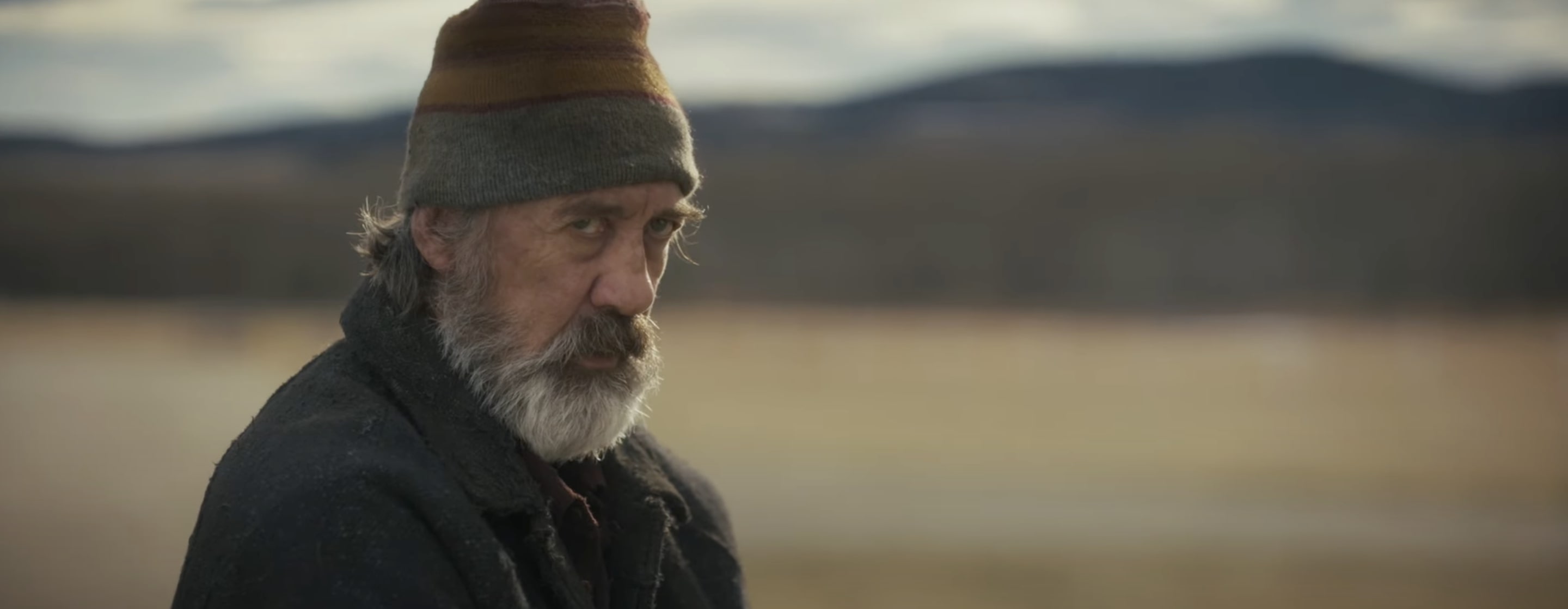
As this happens, Angus delivers two poignant lines. His first reaction, “I’m sorry, son,” expresses regret for his actions and his role in Mason’s traumatic past. Following this dramatic confrontation, he collapses and appears to die. A hospital setup is shown shortly after, suggesting that Mason and Tanis Green have attempted to save him or at least preserve his body. However, in the very last scene, viewers are confronted with unsettling imagery: Angus’ hands and legs begin to move slightly. This subtle yet chilling detail raises profound questions about his state of being.
Is Angus alive? The film deliberately avoids providing a definitive answer. These movements indicate that Angus has survived the exorcism but remains under the influence of the divine entity. Alternatively, they can be residual effects of possession—a lingering connection between the old man’s physical form and the holy force that once inhabited him. The ambiguity aligns with the overarching themes of ‘Shadow of God,’ challenging viewers to interpret whether Angus’ survival is a blessing or a curse. The sequence ties back to earlier events in the film, which portray Mason grappling with theological dilemmas about possession and faith.
Throughout ‘Shadow of God,’ Mason struggles to reconcile his belief in divine goodness with the destructive consequences of holy possession. The ending mirrors this moral complexity by refusing to provide closure—Angus’ moving limbs symbolize a liminal state between life and death, humanity and divinity. The movie concludes on an enigmatic note that leaves audiences pondering not only the old man’s fate but also broader questions about divine intervention and human agency. By showing Angus’ subtle movements at the end, the horror flick suggests that some mysteries remain beyond human comprehension—an unsettling reminder that resolution may not always be attainable when dealing with forces greater than oneself.
How is Angus Harper Resurrected? Is He Really God? How Does Mason Defeat Him?
Angus’ resurrection in ‘Shadow of God’ is shrouded in divine ambiguity and is one of the film’s most mysterious developments. Though previously believed to be dead, he reappears—alive, fearful, and convinced that a higher force is hunting them. His return is not explained through scientific or medical reasoning but is instead implied to be the result of divine possession. Angus himself admits, “They tricked me from the very start,” hinting that his resurrection wasn’t an act of mercy but part of a larger, more ominous plan. Throughout the film, he displays increasingly erratic behavior. At times, he appears like a traumatized man seeking redemption, and at other moments, he speaks in an unknown language and radiates supernatural power—light pouring from holes in his face, objects shattering around him.
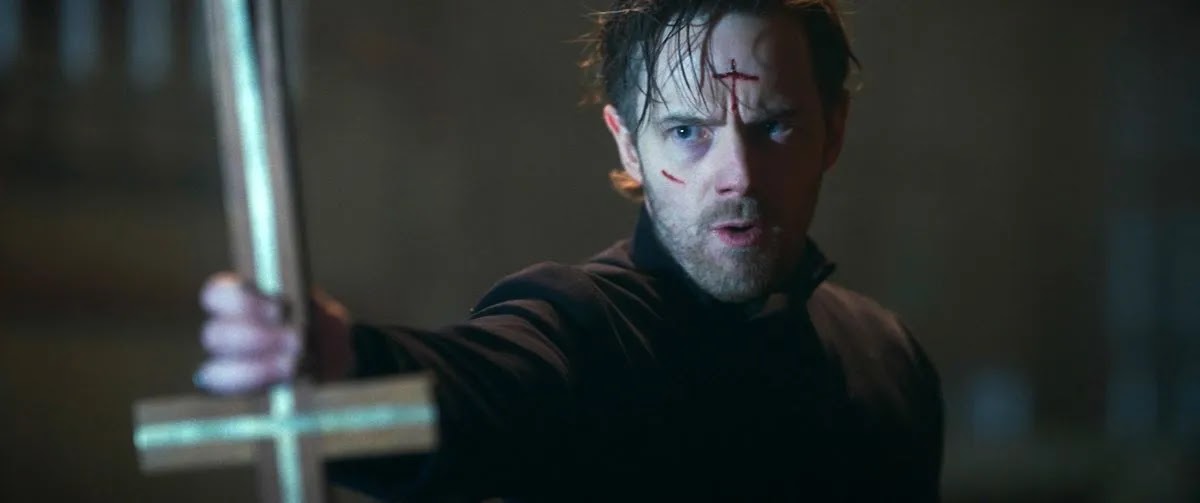
As Mason begins to understand these intricacies, Angus is not merely possessed by a demon but by something far more powerful—possibly God himself or a divine echo abandoned by humanity. This divine entity confesses through Angus, “Just as you abandoned your father, humanity has abandoned me,” suggesting that it has chosen the old man as a vessel to make humanity face its spiritual failures. Whether he is actually God remains intentionally unclear. The being possessing him claims divine status and speaks of humanity’s end with authority, but the film resists confirming its identity outright. The ambiguity forces viewers and the protagonist to confront the blurred line between salvation and destruction.
Mason’s attempt to “defeat” Angus is not a traditional exorcism. Rather, it is a desperate ritual to sever the connection between the divine presence and the mortal world. He performs an exorcism, asking the name of the spirit repeatedly, as tradition dictates. The possessed Angus delivers cryptic and painful revelations, even peeling off his face to challenge Mason’s understanding of God and evil in one moment. The spirit then states, “There is no salvation here, Father. Only destruction.” Ultimately, Mason realizes he cannot fight the entity through force or ritual alone. Instead, he accepts the truth of what his father has become and uses a divine relic—a dagger given to him in a vision—to pierce the mortal form of the possessed Angus.
This act doesn’t just stop Angus; it seemingly closes the breach between God and man, halting the divine judgment sweeping through the world. The stabbing is both an act of mercy and a form of spiritual rebellion. Thus, Angus is not definitively revealed as God but as a vessel for something divine and wrathful. Mason defeats him not with faith alone but through an act of deeply personal conviction—choosing to end the cycle of pain, abuse, and divine punishment that began with his father.
Who Gives Mason the Relic From the War of Heaven? What is its Significance?
The final act of ‘Shadow of God’ takes a surreal and metaphysical turn that reshapes both Mason’s trajectory and the mythos of the world. Just before the brutal climax, the exorcist—who has been spiraling under the weight of religious obsession, divine prophecy, and personal guilt—is thrust into an otherworldly state that redefines the boundaries of time, space, and belief. After Beau confronts Mason and compels him to participate in the arcane ritual of summoning God, he, overwhelmed and afraid, flees the scene with his gun. Disoriented, he stumbles into a small shop, panicking and desperate, asking the shopkeeper to use a telephone.
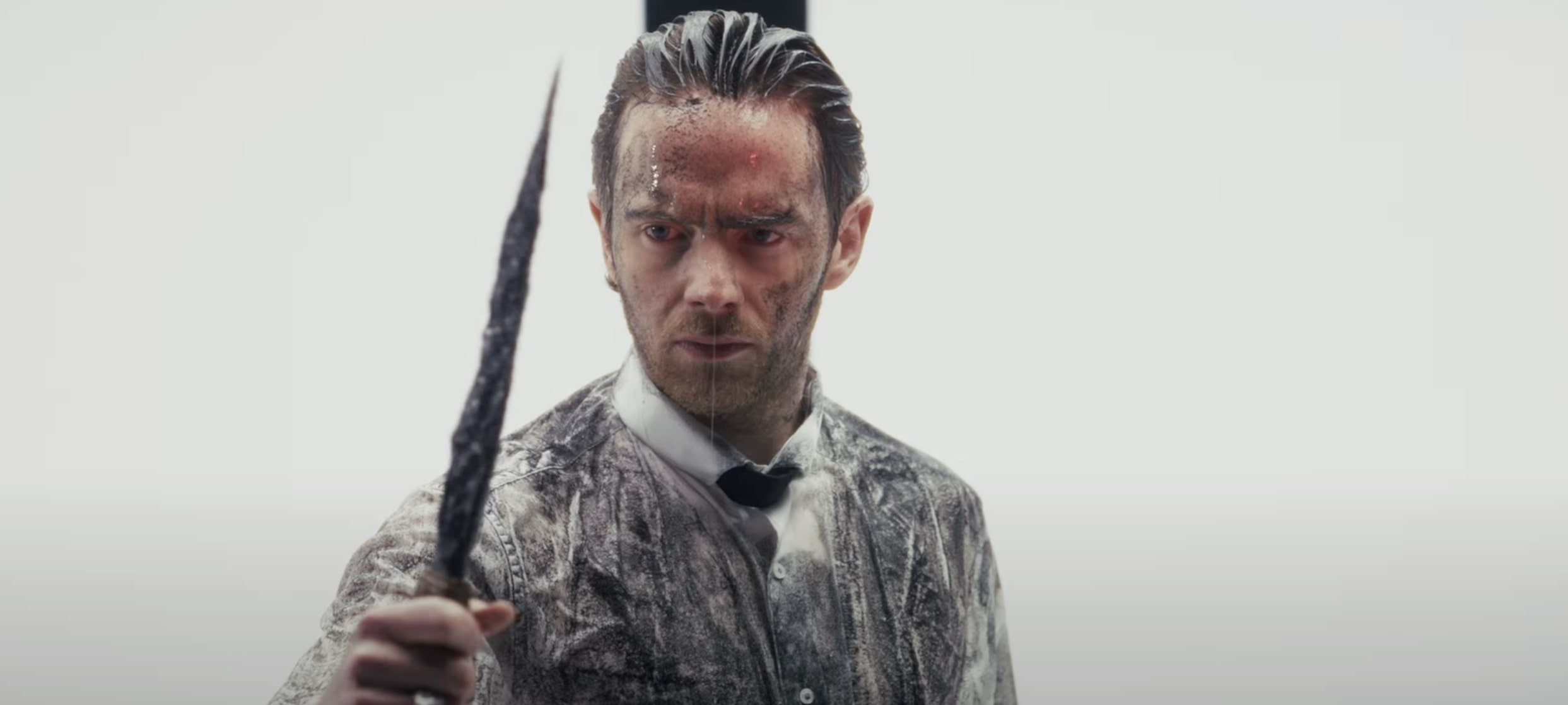
The shopkeeper obliges, but this moment of mundane human connection is ripped apart when he unexpectedly strikes Mason with a baseball bat. This jarring act serves as the transition from physical reality to something altogether more divine—or perhaps, more damned. Mason awakens in a realm that is visually stark: an endless expanse of white, devoid of sound or shadow. His body is covered in black slime, symbolic of the weight of sin, doubt, and the corruption he has endured. It’s in this purgatorial in-between that a voice emerges—not booming, but calm and measured as it belongs to something older than time. There is no visible form at first, only the voice.
Then, from the whiteness, a silhouette appears and hands Mason a dagger, its blade glinting with a faint celestial glow. The voice refers to it cryptically as “a relic from the War of Heaven.” The dagger is not explained in concrete terms—no exposition, no flashback—only hints that it was forged during a cataclysmic battle between gods, angels, and forgotten beasts. Its purpose is singular: to end divinity. This gift marks a profound turning point in the film. Mason, who has spent most of the story running from purpose, is now given the very thing that can kill God—or whatever now walks in his skin.
Reemerging from the white void, transformed, Mason finds himself back amid chaos. Angus, who is now revealed as a mortal shell possessed by the God of Suffering, is poised to bring about a cataclysm. Mason confronts him, calm and grim. In the final moments, he doesn’t raise a gun and doesn’t scream or plead. He simply walks forward and drives the dagger—this relic of Heaven’s fall—into Angus’ heart. The god within screams, not in pain, but in recognition. As light pours from the wound, we understand that the dagger does not just kill God. It ends the cycle—of belief, of control, of divine cruelty. The relic isn’t a weapon. It is closure. In that act, the protagonist becomes more than a man. He becomes a threshold—between faith and doubt, between punishment and peace. The War of Heaven ends not with fire but with one man choosing to say enough.
Why Do Beau and His Cult Members Die?
The gut-wrenching climax of ‘Shadow of God’ depicts Beau and his fellow devout Catholics dying moments after Mason successfully completes the summoning ritual. Their deaths aren’t random or collateral—they are pointed, symbolic, and deeply rooted in the film’s exploration of faith, guilt, and divine justice. What the Church believes will be their moment of triumph, where they will witness the descent of the true God and finally be rewarded, instead becomes their undoing. Before this divine retribution, Beau and his followers subject Mason to a gruesome purification ritual. A large nail is driven into his hand, an act that deliberately echoes the pain and imagery of Christ’s crucifixion.
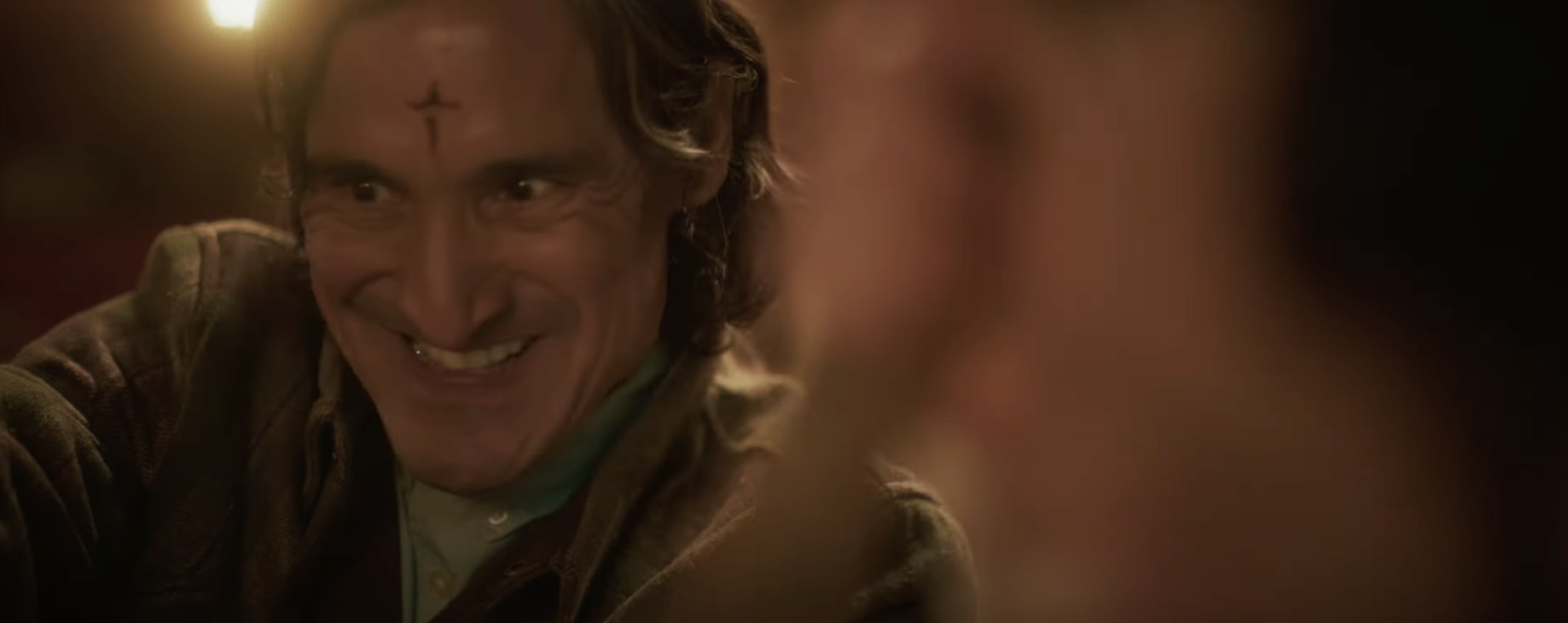
But here, there is no grace—only violence masquerading as salvation. This moment is also a painful callback to the abuse Mason suffered at the hands of Angus during his youth, drawing a haunting parallel between the cruelty of his past and the religious zealotry of his present. As the ritual progresses, Beau mercilessly whips Mason. Each lash is framed as a demand for confession, but the act is more about dominance than redemption. The exorcist is not treated as a man or even a sinner but as a tool—someone to be broken and reshaped in the Church’s image. When a cross is marked on his forehead, it doesn’t sanctify him. It brands him. The ritual, drenched in religious symbolism, becomes a spectacle of psychological and physical torture.
Mason complies not out of faith but out of desperation. Tanis, someone he deeply cares for, is threatened with death. This crucial detail underlines the manipulative tactics of Beau and his followers—they weaponize love and fear to force obedience. The ritual to summon God begins, and the father performs it, not as a believer but as a man with no other choice. When the true God arrives, its presence is blinding, wordless, and unfathomable. Beau, who expected divine affirmation, instead meets immediate and total annihilation. His body, along with those of the other zealots, is reduced to nothing. There is no speech, final judgment, or recognition of Beau and his cult’s devotion. Just an overwhelming force that consumes them in an instant.
This act of divine erasure carries immense weight. It reveals that God—at least in the world of the ‘Shadow of God’—has no patience for those who twist faith into fanaticism. Beau and his kind preach suffering as purification, but their brand of devotion is rooted in violence, control, and self-righteousness. The very God they try to control and weaponize ultimately turns on them, viewing them not as faithful servants but as blasphemers who corrupted the sacred. Their deaths aren’t a punishment for disbelief but for the arrogance of believing they speak for God. Ultimately, it’s not the broken or the lost who are judged. It’s the ones who inflict pain in God’s name—and the verdict is final.
Read More: Classified Ending Explained

